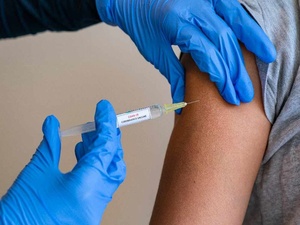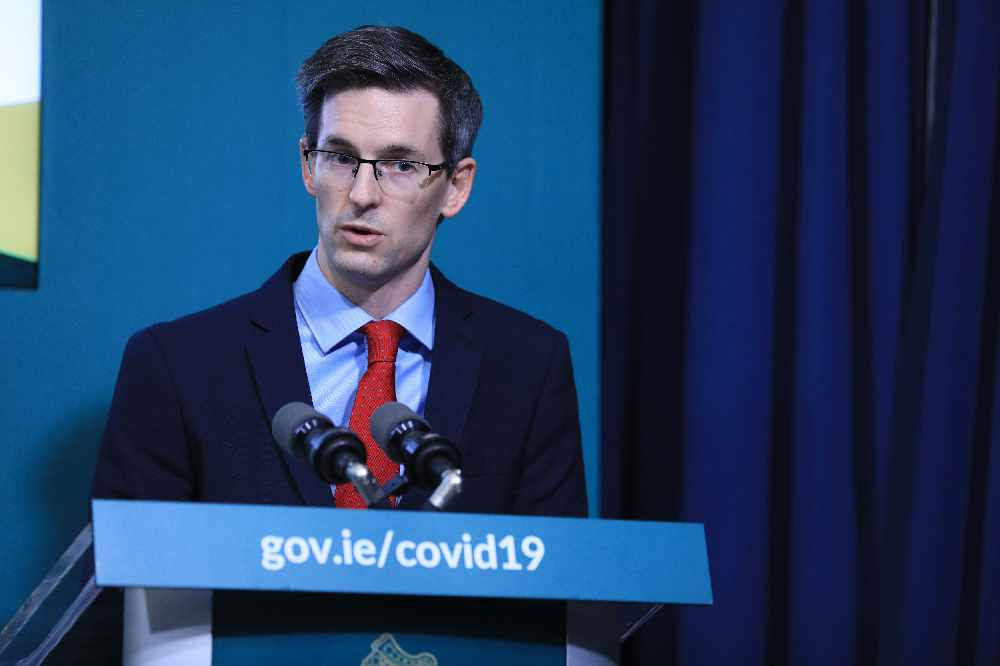
by Michael McHugh, PA
Use of the AstraZeneca Covid-19 vaccine should be temporarily suspended, Ireland’s deputy chief medical officer Dr Ronan Glynn said.
Serious blood clotting has been recorded after inoculations in Norway.
The Irish authorities have been pressing the pharmaceutical firm to speed up its supplies to the Republic.
Dr Glynn said: “This recommendation has been made following a report from the Norwegian Medicines Agency of four new reports of serious blood clotting events in adults after vaccination with Covid-19 vaccine AstraZeneca.
“It has not been concluded that there is any link between the Covid-19 vaccine AstraZeneca and these cases.
“However, acting on the precautionary principle, and pending receipt of further information, the National Immunisation Advisory Committee (NIAC) has recommended the temporary deferral of the Covid-19 vaccine AstraZeneca vaccination programme in Ireland.”

Dr. Ronan Glynn Deputy CMO during a joint press conference at Government Buildings in Dublin - PA photo
Several other European countries temporarily suspended AstraZeneca jabs following reports of people suffering blood clots.
The European Medicines Agency (EMA) reported one person in Austria was diagnosed with blood clots and died 10 days after vaccination, but it stressed there is “currently no indication that vaccination has caused these conditions”.
Another person was admitted to hospital in Austria with pulmonary embolism (blockage in arteries in the lungs) after being vaccinated, while one death involving a blood clot was reported in Denmark.
A 50-year-old man is also thought to have died in Italy from deep vein thrombosis (DVT), while there has been an unconfirmed report of another death in Italy.
Denmark, Norway and Iceland have said they are temporarily halting all AstraZeneca vaccinations to investigate the reports.
Italy also followed Austria, Estonia, Latvia, Luxembourg and Lithuania in banning jabs from one particular batch of one million AstraZeneca vaccines, which was sent to 17 countries, after reports of a death.
Ireland’s governing Coalition has been under fire over the speed of its vaccination response.
Around 600,000 doses of vaccine – across all manufacturers – have so far been delivered.
That includes the most elderly, those in nursing homes and healthcare workers.
The EMA has initiated an urgent review of all blood clotting events occurring with the AstraZeneca vaccine to determine if there is a possible safety risk.
A statement from Ireland’s Health Products Regulatory Authority (HPRA) said: “To date, the HPRA has received a small number of reports associated with blood clots following vaccination with the AstraZeneca vaccine.
“However, it has not received any reports of the nature of those described by the Norwegian Medicines Agency.
“We will continue to monitor national reports very closely and continue to encourage the reporting of any suspected side-effect following vaccination with a Covid-19 vaccine.”
It said there is currently no indication that vaccination was the cause of these events and there may be alternative unrelated explanations for their occurrence.
The authority added: “However, the safety of the public is of the utmost importance, and it is essential that reports of potential safety concerns, even if very rare, are rigorously and swiftly investigated so that the public can be reassured and if required, appropriate action can be taken.”
The preliminary assessment of similar events published by the EMA on 11 March found the number of blood clotting events in vaccinated people was no higher than the number seen in the general population.
As of March 10, 30 cases of blood clotting events were reported in the EMA’s database of side-effects following vaccination of close to 5 million people in the European Economic Area.
A thorough analysis of all relevant reports will be performed, including those newly notified from Norway, authorities said.
AstraZeneca was approved for use early in the UK; Northern Ireland has made proportionately faster progress than the Republic in reaching the most vulnerable.
Irish Taoiseach Micheal Martin held “positive” discussions with AstraZeneca chief executive officer Pascal Soriot on Friday evening.
He has expressed frustration at the failure of the company to meet delivery schedules for inoculations.
Ireland’s Minister of State for Mental Health and Older people has said Ireland “is still on track” to have all over-70s vaccinated by mid-May with the supplies they have received to date, despite disruption from AstraZeneca.


 Two men arrested on suspicion of attempted murder after man found injured
Two men arrested on suspicion of attempted murder after man found injured
 Teenage driver arrested after passenger killed in collision
Teenage driver arrested after passenger killed in collision
 Two men remanded over murder of pensioner in Co Tyrone
Two men remanded over murder of pensioner in Co Tyrone
 Man arrested in O’Hagan murder probe charged with fraud
Man arrested in O’Hagan murder probe charged with fraud
 Kimmins ‘stands firm’ following row over station Irish language signs decision
Kimmins ‘stands firm’ following row over station Irish language signs decision